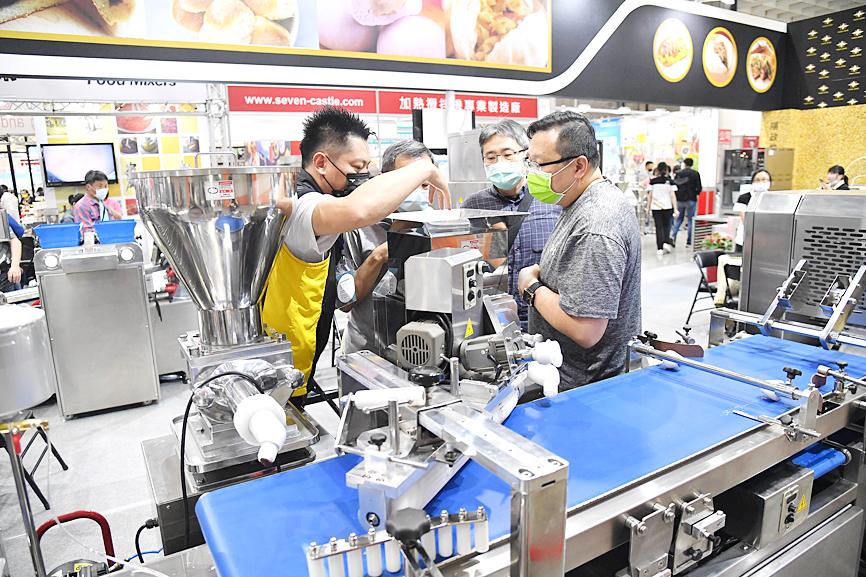The government’s business climate monitor last month remained “yellow-red,” as imports of machinery equipment and manufacturing sales slackened somewhat, the National Development Council (NDC) said yesterday.
The overall score of all constituent readings shed two points to 34, showing that the nation’s economy remains vibrant, although the pace of growth lost some momentum, NDC research director Wu Ming-huei (吳明蕙) said.
The council uses a five-color system to depict the nation’s economic state, with “green” indicating steady growth, “red” suggesting a boom and “blue” signaling a recession. Dual colors indicate a shift to a stronger or weaker state.

Photo: CNA
“I am confident that Taiwan’s GDP growth should exceed 4 percent this year in light of robust exports, industrial production and manufacturing sales,” Wu told a media briefing.
“Green” and higher signals on the system suggest robust economic conditions, aided by active private investment, Wu said.
The official attributed the mild slowdown to uncertainty over regional geopolitical tensions, and soaring international energy and raw material prices, which are casting a shadow on the global economic landscape.
Worsening inflation has led global research bodies to trim their GDP growth forecasts for the US and Europe, Wu said, adding that rising crude oil prices would increase production costs, constrain corporate profits and affect the economy in Taiwan.
The index of leading indicators, which aims to portray the economic situation in the coming six months, shrank 0.64 percent from a month earlier to 100.65, as all seven constituents fell, the council said.
Wu said the trend is not a sign of economic downturn, but agreed that a slowdown is occurring, which she said needs to be closely monitored.
The council expects to pay particular attention to whether the war between Russia and Ukraine dampens Taiwan’s export orders, she said.
Commentators have downgraded the target prices of technology shares on concern that higher inflation could deter people from buying consumer electronics products.
The war’s effects could become more evident soon, beyond ongoing financial market swings and energy price hikes, Wu said.
The index of coincident indicators, which reflects the current economic state, expanded 0.32 percent to 102.99, as the indices for employment, industrial output and exports, as well as wholesale, retail and restaurant revenues picked up, the council said.
However, manufacturing sales and power consumption as well as imports of electrical and machinery equipment showed negative cyclical movements, it said.

GROWING OWINGS: While Luxembourg and China swapped the top three spots, the US continued to be the largest exposure for Taiwan for the 41st consecutive quarter The US remained the largest debtor nation to Taiwan’s banking sector for the 41st consecutive quarter at the end of September, after local banks’ exposure to the US market rose more than 2 percent from three months earlier, the central bank said. Exposure to the US increased to US$198.896 billion, up US$4.026 billion, or 2.07 percent, from US$194.87 billion in the previous quarter, data released by the central bank showed on Friday. Of the increase, about US$1.4 billion came from banks’ investments in securitized products and interbank loans in the US, while another US$2.6 billion stemmed from trust assets, including mutual funds,

AI TALENT: No financial details were released about the deal, in which top Groq executives, including its CEO, would join Nvidia to help advance the technology Nvidia Corp has agreed to a licensing deal with artificial intelligence (AI) start-up Groq, furthering its investments in companies connected to the AI boom and gaining the right to add a new type of technology to its products. The world’s largest publicly traded company has paid for the right to use Groq’s technology and is to integrate its chip design into future products. Some of the start-up’s executives are leaving to join Nvidia to help with that effort, the companies said. Groq would continue as an independent company with a new chief executive, it said on Wednesday in a post on its Web

Even as the US is embarked on a bitter rivalry with China over the deployment of artificial intelligence (AI), Chinese technology is quietly making inroads into the US market. Despite considerable geopolitical tensions, Chinese open-source AI models are winning over a growing number of programmers and companies in the US. These are different from the closed generative AI models that have become household names — ChatGPT-maker OpenAI or Google’s Gemini — whose inner workings are fiercely protected. In contrast, “open” models offered by many Chinese rivals, from Alibaba (阿里巴巴) to DeepSeek (深度求索), allow programmers to customize parts of the software to suit their

JOINT EFFORTS: MediaTek would partner with Denso to develop custom chips to support the car-part specialist company’s driver-assist systems in an expanding market MediaTek Inc (聯發科), the world’s largest mobile phone chip designer, yesterday said it is working closely with Japan’s Denso Corp to build a custom automotive system-on-chip (SoC) solution tailored for advanced driver-assistance systems and cockpit systems, adding another customer to its new application-specific IC (ASIC) business. This effort merges Denso’s automotive-grade safety expertise and deep vehicle integration with MediaTek’s technologies cultivated through the development of Media- Tek’s Dimensity AX, leveraging efficient, high-performance SoCs and artificial intelligence (AI) capabilities to offer a scalable, production-ready platform for next-generation driver assistance, the company said in a statement yesterday. “Through this collaboration, we are bringing two